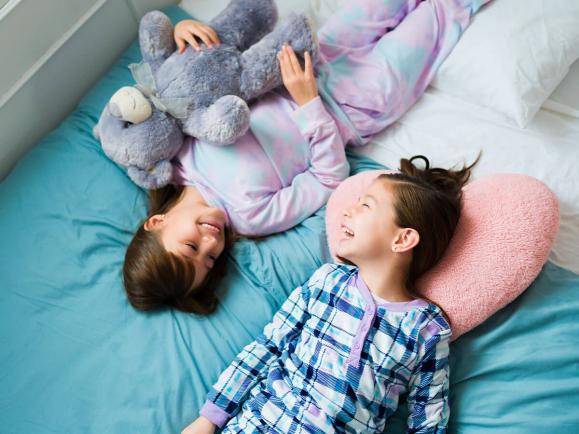
Growing up, sleepovers are something that many kids look forward to. Having a sleepover meant getting to stay up all night, watch movies, play games and have essentially unlimited time with your best friends (until you get picked up by your parents in the morning). Recently, there has been a new trend with some parents who are not allowing their children to have sleepovers. Instead, they are having "sleepunders" or "lateovers." A "sleepunder" or a "lateover" is when a child goes to their friend's house to play or hang out, and then their parents pick them up right before it's time to go to bed. Some may wonder why. Is it because some parents do not trust their friend's parents? Or because they do not trust their children to spend the night just yet? Fox News spoke with two psychologists as well as a parent to gain insight and get their perspective on why some parents prefer their children to sleep in their own beds. "Sleepunders or lateovers are particularly helpful for younger kids or those who have separation anxiety or who are sensitive to sleep or transition issues," said Erica Komisar, a New York-based psychoanalyst, parenting expert and author. She added that the practice isn't about overprotective parents, necessarily. It is more about the parents being sensitive to the individual child's needs. "Some kids can do sleepovers without any hesitation, while others are less comfortable changing their routine," she said. There have been many instances where parents drop their child off for a sleepover but end up coming to get them late at night after their child starts to feel homesick or anxious about being a part from their parents and the comfort of their own home. Having a "sleepunder" or "lateover" could be a compromise for the parents and the child. It gives the child the opportunity to extra spend time with their friend but isn't put under pressure to stay if they don't feel ready yet. "The trend of quasi-sleepovers is a good compromise for parents who may be anxious about having their kids spend the night at other people’s homes," Nicholette Leanza, M.Ed, LPCC-S, a psychotherapist at LifeStance Health in Beechwood, Ohio, told Fox News.
According to Leanza, some parents fear that their children may be harmed while sleeping over at someone else's house, where they would be unable to help them or unable to prevent the harm. "The fears that there may be guns in the home, or that a child may become a potential victim of sexual abuse, are enough to make any parent paranoid and uneasy about letting their kid spend the night elsewhere," she said. Neha J., who lives in New York and who asked that her last name be omitted for privacy, has a 9-year-old daughter. She and her spouse have a strict policy of no sleepovers. "It's just something both me and my husband have grown up with as well. We're not comfortable with our daughter going for sleepovers," she said. Although Neha and her husband do not allow their daughter to have sleepovers, they do allow her to have "sleepunders" or "lateovers" where they pick her up around 11 p.m. "Or [we'll do] the latest the host family will allow us to come get her," she added. "So she can feel like she is getting a sleepover without actually spending the night."
The impact on kids who have "sleepunders" can differ from each individual child, according to Leanza. "Some kids may prefer to sleep in their own beds, so they don’t mind being picked up without spending the night," she said. "But others may feel embarrassed that they aren’t allowed to spend the night and that they're different from their peers." Neha shared that as her daughter has grown older, there has been pushback about "sleepunders" from her child. "As she's grown older, this arrangement sometimes disappoints her," she said. "We explain to her that, while we understand her desire to stay with friends, as parents, we feel more comfortable having her at home for the night, especially when we aren't well-acquainted with the other child's family." She added, "We emphasize that it's not a matter of trust in her, but rather a decision we've made based on our comfort level." Neha's reasoning for not allowing sleepovers and picking her daughter up before bedtime is simply for peace of mind about her daughter's safety. "We believe children are most vulnerable when asleep, and by bringing her home, we eliminate even the slightest possibility of harm or discomfort that might occur in an unfamiliar environment," she said.
Experts note that the practice of "sleepunders" could be a trial run for sleepovers in the future. "Parents might start by allowing kids to sleep over at the homes of people they know well and trust," said Leanza. "That may be close relatives or the homes of other loved ones, and this can be a sort of test run for both the kid and the parent." She noted, "My advice would be for parents to be cautious but not overprotective. We all want to protect our children, but we also don’t want to smother them. It’s all about balance."

